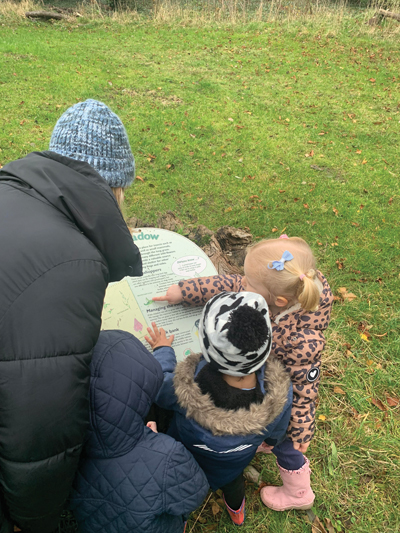
by Marsha Dann
Lead Teacher, Play B C Preschool
Our very young children spend an increasing amount of time on screens and statistics suggest they typically spend less time outdoors than prisoners. In his book ‘Last Child in the Woods’, Richard Louv coins the concept of Nature Deficit Disorder and brings together research which indicates that reduced exposure to the outdoors is actually harmful to children. This can be mitigated by prioritising outdoor play which has a number of benefits for our preschoolers.
Physical health
Natural light and fresh air contribute to overall wellbeing, strong immune systems and healthy growth. Active outdoor play offers a wealth of opportunities for movement and exercise, promoting the development of co-ordination, fitness and motor development. It will also help children later down the line at school because cross crawl activities such as climbing or skipping get both sides of the brain working which helps mastery of bilateral tasks such as using a knife and fork, writing or using scissors. Furthermore, motor control develops from the core of the body outwards so sufficient upper body strength will be critical in developing manual dexterity.
Sensory development
The great outdoors is a sensory playground for stimulating children’s senses in ways that are just not the same indoors. From the feel of grass underfoot to the sound of birds chirping overhead, outdoor exploration engages all five outer senses, and the inner senses too, fostering development crucial for learning and perception. Children learn to observe, feel, smell, and listen, enhancing their understanding of the world around them and enriching their cognitive abilities.
Social skills
Outdoor play provides invaluable opportunities for children to interact with their peers in unstructured environments. Whether they’re building sandcastles at the beach, playing tag in the park, or working together to collect items on a nature scavenger hunt, outdoor activities encourage teamwork, communication, and co-operation. Through shared experiences and spontaneous play, children learn important social skills such as empathy, negotiation, and conflict resolution, laying the foundation for healthy relationships and social development.
Cognitive benefits
The outdoor environment is constantly changing and this supports learning and discovery through exploration, experimentation, and problem-solving. Whether it’s observing insects in the garden, identifying different plant species, or finding out what happens when you mix mud and water, outdoor play stimulates curiosity and creativity. Studies show that time spent in nature enhances cognitive function, improves attention span, and promotes mental wellbeing.
Appreciation for nature
Outdoor play fosters a sense of wonder and awe in children, and instils a deep appreciation for the natural world. Nurturing a connection to nature from an early age will teach children to understand cycles of growth and decay. Respecting and caring for the Earth and its plants, animals, and ecosystems will encourage them to embody principles of conservation and sustainability.
Whatever the weather, outdoor play will bring benefits all year round, and combat Nature Deficit Disorder. However, as the days are now starting to brighten and lengthen, there is no better time to get head out, soak up some Vitamin D and the other many benefits that only the great outdoors can offer.
Marsha Dann, lead teacher, Play B C Preschools. Play B C offers teacher-led provision, which prioritises relationships, sensitive interaction, and fun but challenging learning through developmentally appropriate activities for a wonderfully diverse cohort. More than just a place, at Play B C every day is a learning adventure. www.playbc.co.uk











